
Learning a new skill is quicker than ever online. Through Udemy, Coursera, and other virtual platforms, anyone can access classes covering many topics.
So, how about hydrology classes? Yes, there are hydrology courses online across multiple platforms.
Here, you’ll find a list of ten of the best online hydrology online courses and what makes each one unique.
To wrap up, I’ll address some frequently asked questions concerning the study and application of hydrology. Let’s begin.
Hec-RAS and ArcGIS for Hydrologic Engineering
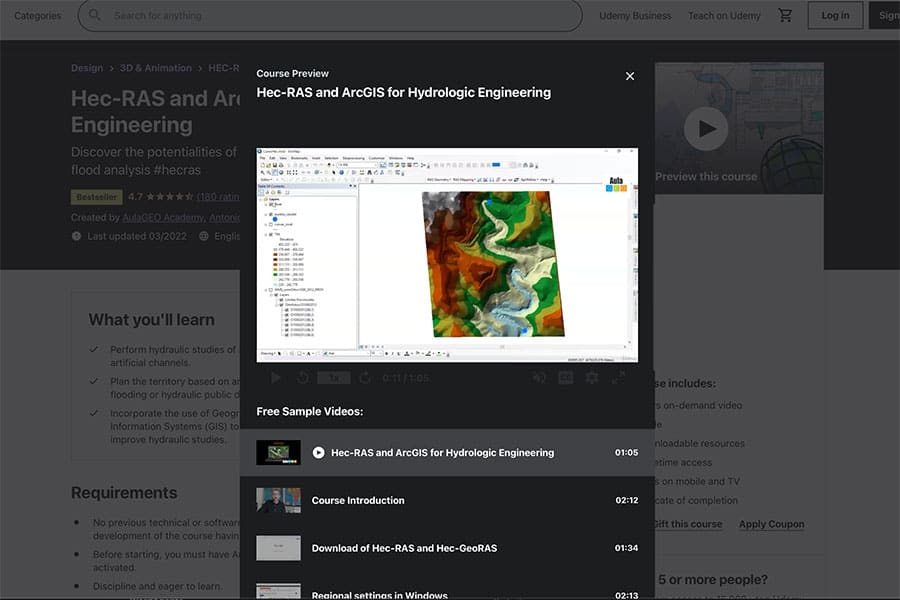
This class teaches hydrologists ArcGIS and Hec-RAS, the digital tools they need for mapping and modeling 2D river systems.
Students also learn how to study the movement and flooding of artificial and natural water systems.
Hec-RAS and ArcGIS for Hydrologic Engineering is a fourteen-part, two-hour course with full lifetime access.
After completing, students earn a graduate certificate and can download nine additional resources to aid their studies. Closed-captioning is available in 14 languages, including Arabic.
ArcSWAT Model with ArcGIS – Run for Any Study Area – GIS
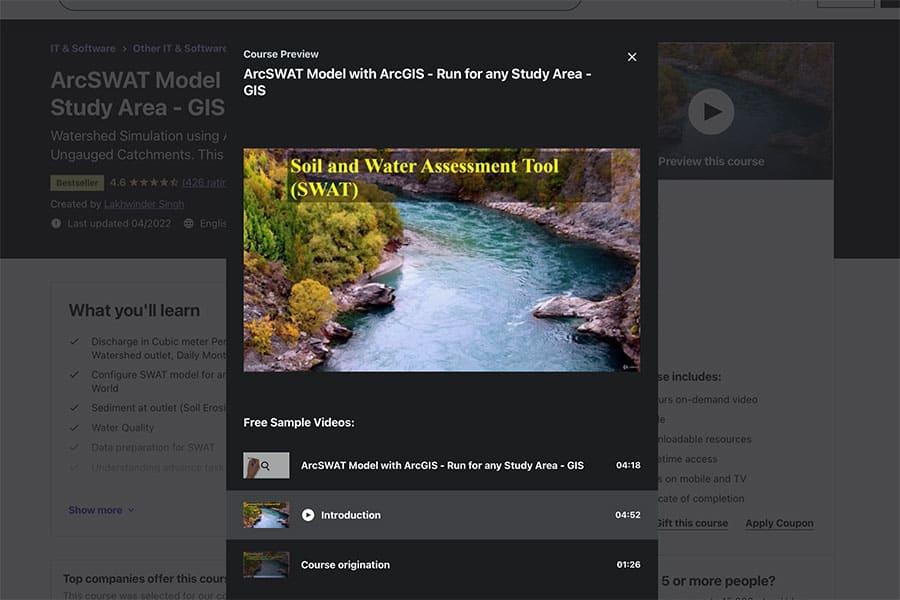
ArcSWAT Model with ArcGIS on is another hydrologic engineering software course.
SWAT (Soil & Water Assessment Tool) is a predictive modeling tool that allows students to predict how erosion, yield, and other factors will change.
While many other classes provide hydrology tech overviews, this course is an in-depth study of the discipline’s most critical tool.
It is an advanced course, so students must have prior knowledge of GIS and fluid mechanics before enrolling.
This 4.5-hour course is available on-demand forever after purchase. Subscribing students get access to six supplemental materials and earn a certificate after completion.
The class is only available in English. It is endorsed by industry leaders like Nasdaq and Volkswagen.
Free Course: Basic Hydrology
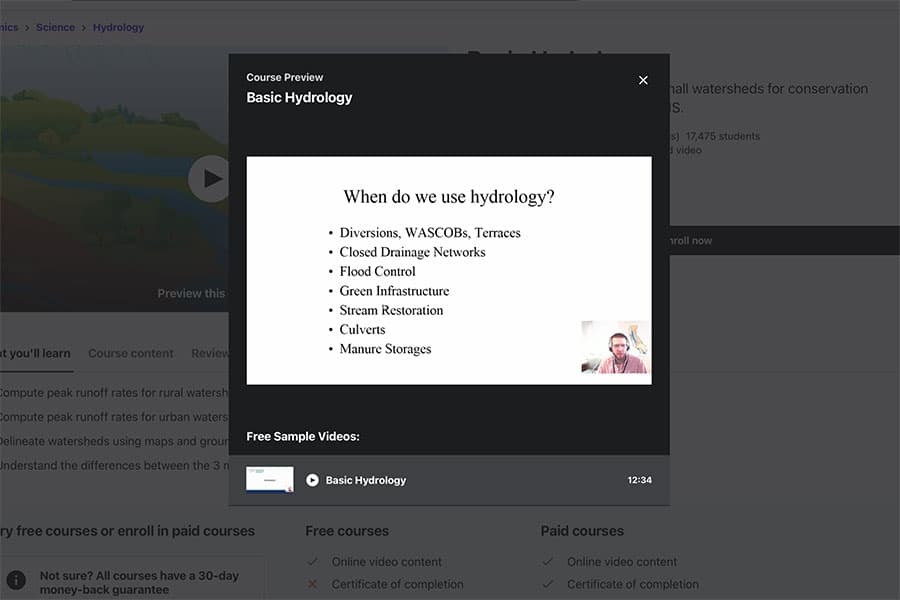
Basic Hydrology is a free course that teaches students to compute watershed runoff in urban and rural areas.
It also demonstrates how to use critical field software and elaborates on the differences between widely-used hydrology models.
The course is completely free, but as a result, students will not earn certificates or be eligible for instructor Q&As.
Being a beginner-level course, Basic Hydrology is a great option for anyone who wants to learn or polish foundational knowledge about hydrologic software.
The class is only available in English and runs for about two and a half hours.
Groundwater Potential Zones GIS – Complete Project ArcGIS
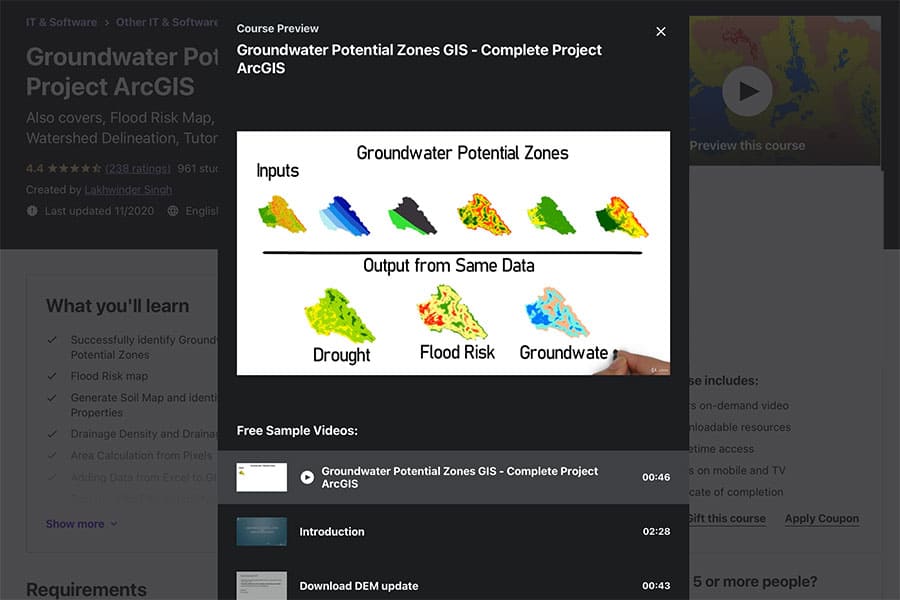
Groundwater Potential Zones GIS teaches students to simulate and interpret flood risk areas, watershed delineations, and more.
This intermediate course expands upon your knowledge of GIS software and groundwater flow, so it is a more beginner-friendly option than other online courses. Taking this class is a great way to master ArcGIS software.
After completing the four-hour class, students will earn a certificate. This class isn’t free, but its content in video and file form is forever accessible after purchase.
Groundwater Potential Zones GIS is only available in English.
Natural Attenuation of Groundwater Contaminants
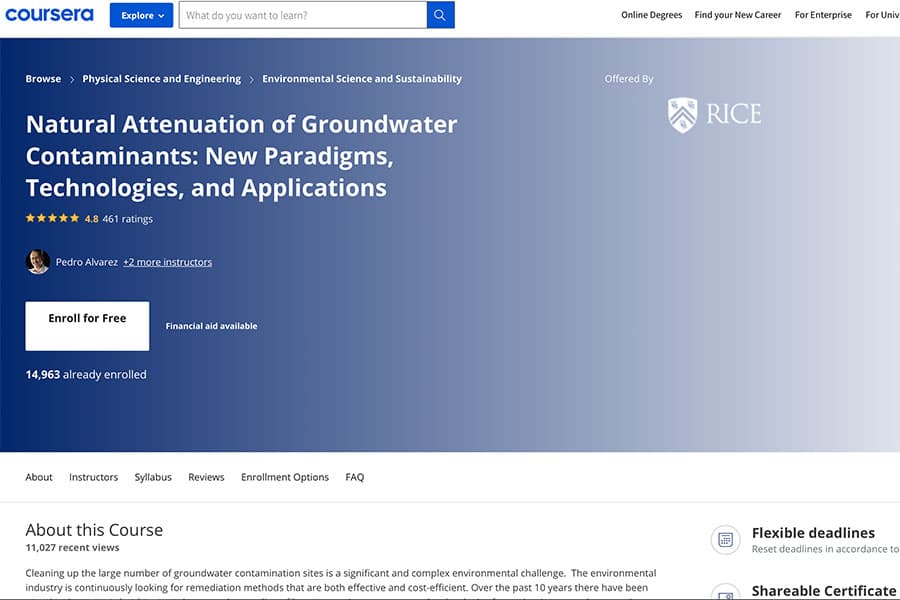
This Coursera class teaches valuable technologies for groundwater attenuation, a task that many hydrologists and environmental engineers address.
Sponsored by RICE University, this class is best suited for students pursuing higher education in hydrology.
This in-depth course covers 28 hours of content across nine weeks.
Students primarily learn to collect groundwater data through new technologies and models.
Natural Attenuation of Groundwater Contaminants and water quality is an advanced course that does not teach beginner information. Readings and quizzes are mandatory for full participation.
The class content is only available in English. It is free to enroll but participating for free will not allow you to earn a certificate upon completion.
Climate Change and Water in Mountains: A Global Concern
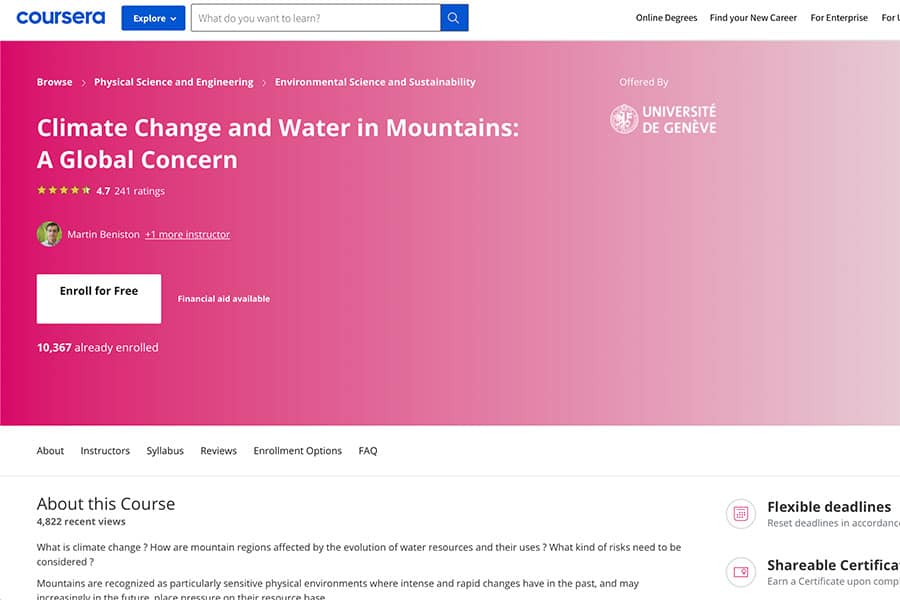
Climate Change and Water in Mountains is an intermediate hydrology course about the effect of manmade watersheds on mountain environments.
Students in the class learn to identify the impact of climate change on hydropower and agriculture.
Across four weeks, students engage with 17 hours of video content and multiple-choice quizzes. It is an intermediate-level course, and it teaches prerequisite information early on.
Enrollment for this Coursera class offered by one of the top universities (geneva) is free. Subscribing participants earn a certificate when they complete the class.
The class has English audio but students can watch with subtitles in five languages: English, Portuguese, French, Spanish, and Russian.
Global Environmental Management
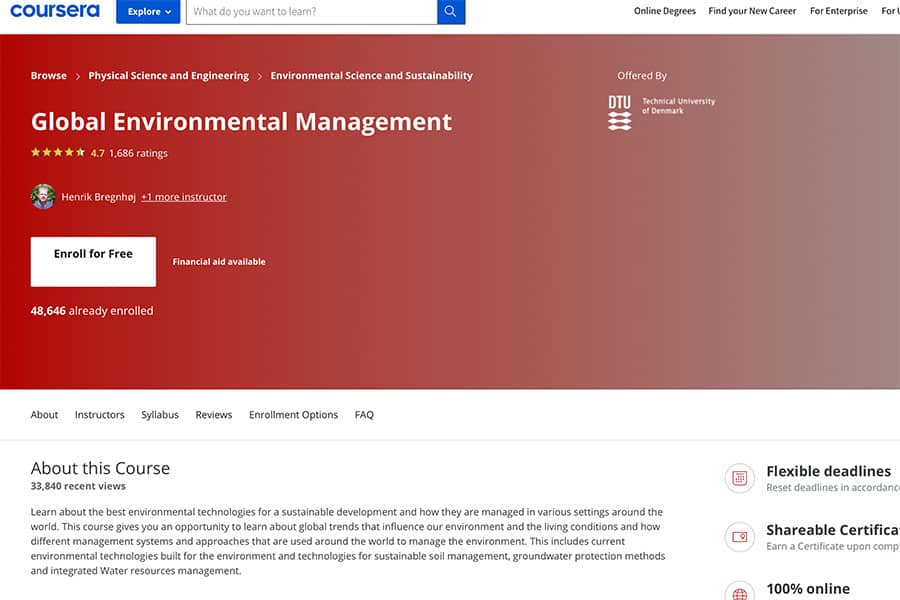
Sponsored by the Technical University of Denmark, this class is free to enroll on Coursera.
It converges with environmental disciplines, teaching students about the technologies necessary for groundwater water quality, hydrologic modeling and resource management.
Participants also learn about energy-efficient urban planning for ideal land use and resource distribution.
The course length is about 11 hours across five weeks, with each day’s runtime distributed unevenly.
It is a completely online intermediate-level class including various case studies perfect for those already in the hydrology discipline.
Subscribing students earn certificates upon completion but subscriptions aren’t necessary to enroll.
The class audio is only in English. Subtitles in nine languages are available, including most major European languages and Arabic.
Computational Watershed Hydrology
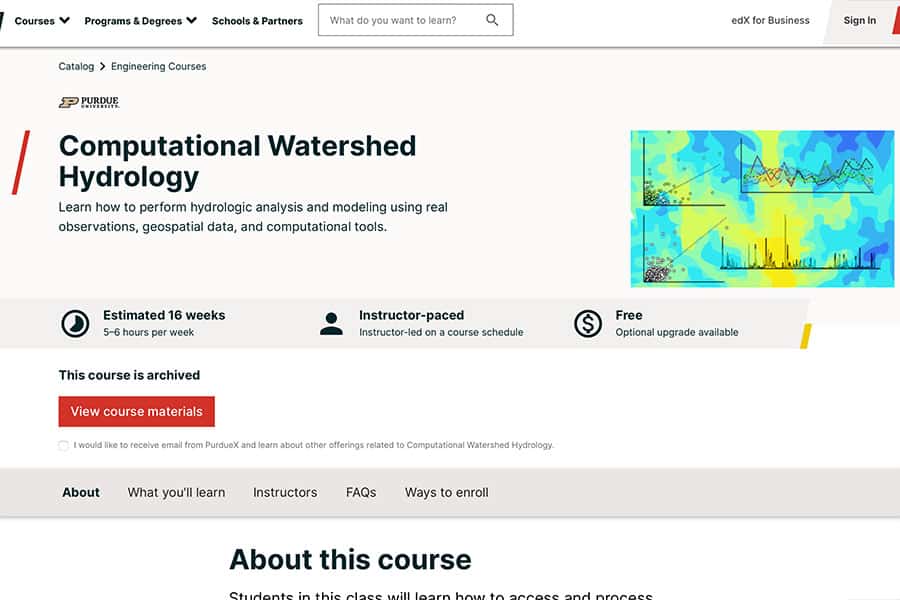
This is a Purdue University-sponsored hydrologic engineering course. In Computational Watershed Hydrology, students learn to analyze the movement of water through observation, tools, and geospatial data.
By using software like ArcGIS, Hec-RAS, and more, participants learn about water topography.
This full-length course runs for sixteen weeks. Students must devote five or six hours per week, and they must purchase an ArcGIS license before enrollment.
On edx.org, this class is available for free. However, a premium paid option grants a certificate, assignments, and exams that free users cannot access. The audio and transcript for this course are only available in English.
Flood Risk Management
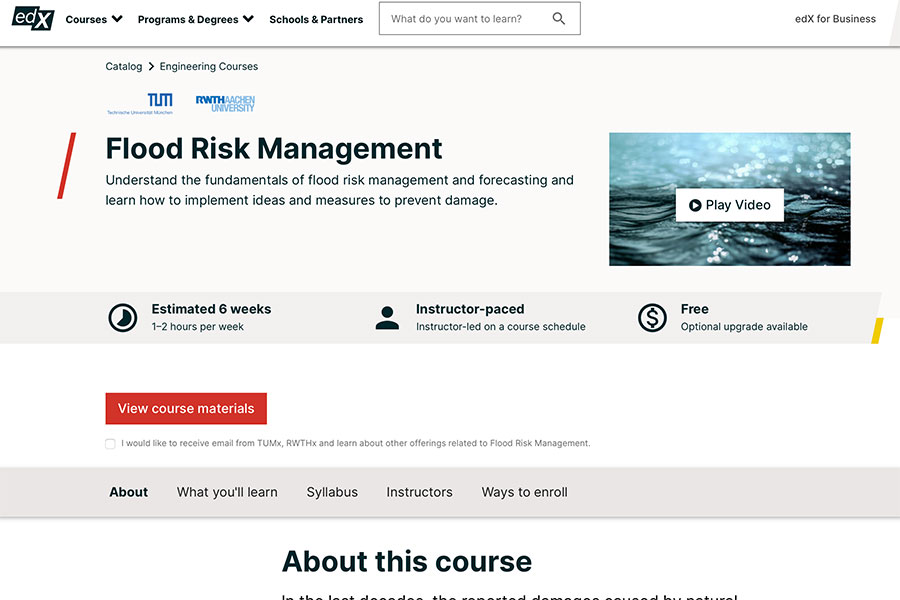
Flood Risk Management is a basic-level course about how the EU handles threats of water level increases.
The course content includes using hydrodynamic tools to predict potential disaster areas. The class also teaches students to understand hydrologic flood models.
Students will need some prior knowledge, but they do not need prior knowledge, experience, or study to participate. The class is free to enroll but subscribing students earn a certificate upon completion.
Flood Risk Management is a relatively low-commitment option. The course lasts six weeks, requiring only one or two hours per week. The class audio and transcripts are only available in English.
Groundwater Cycle
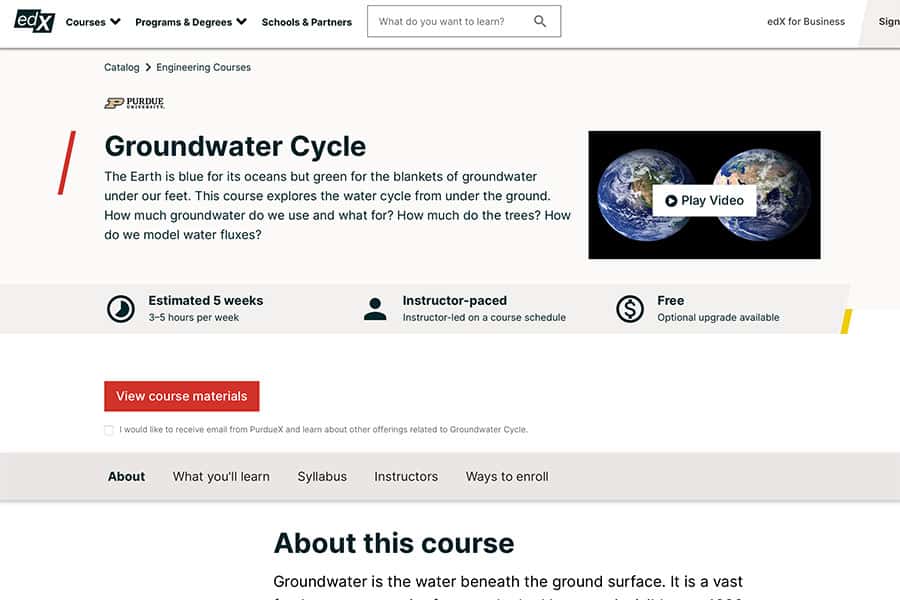
Groundwater Cycle is a foundational course for anyone interested in hydrology.
There are no prerequisites, and students will learn to define key terms and scientific laws that form the basis of the discipline.
Participants will interpret hydrographs and apply Darcy’s law, which heavily influences subsurface hydrological processes.
Groundwater Cycle is a Purdue University-sponsored online course lasting five weeks.
Students must devote between three and five hours per week. Like the other options, this class is free, but only subscribing participants get full access to class materials and certificates.
The audio and transcript for Groundwater Cycle are in English only.
Frequently Asked Questions
Now that we’ve seen ten online hydrology course options, let’s address some common questions about the science.
Conclusion
Hydrology is a fascinating and critical science for both rural and urban development. Thankfully, many courses on the subject are available online for free or for a flat rate.
Enrolling is an easy way to make noticeable progress toward an academic discipline in hydrology.
Thank you for reading. Please feel free to leave a comment, review, or a course suggestion below.
Additional Resources
Edwards, P.J., Williard, K.W. and Schoonover, J.E., 2015. Fundamentals of watershed hydrology. Journal of contemporary water research & education, 154(1), pp.3-20.
Ramírez, J.A., 2000. Prediction and modeling of flood hydrology and hydraulics. Inland flood hazards: Human, riparian and aquatic communities, p.498.
Zektser, I.S. and Loaiciga, H.A., 1993. Groundwater fluxes in the global hydrologic cycle: past, present and future. Journal of hydrology, 144(1-4), pp.405-427.
What is Hydrology? | U.S. Geological Survey – USGS.gov
American Institute of Hydrology


Thanks for these resources! Not in the field but interested don’t know if it’s a possible career pivot.
Thanks for your comment, there is a growing demand for hydrologists in mining, construction, and hydraulic fracturing fields. With increasing environmental concerns, especially global climate change, there is likely to be an even greater demand in the future.